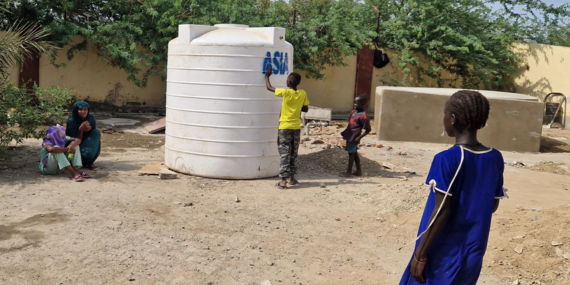Sudan: Water, shelter and hope for displaced people in Port Sudan

By Alimbek Tashtankulov, OCHA Sudan
Port Sudan: On the outskirts of Port Sudan, an unassuming old building known as Alshahinat IDPs (internally displaced persons) Gathering Centre belies its capacity to house more than 1,000 people. Each of these individuals has sought refuge here from the conflict that erupted in Sudan’s capital, Khartoum, in mid-April.
Maij Ankoni and her six children fled southern Khartoum’s Mayo neighbourhood and made their way to Alshahinat. She received household essentials, including cooking utensils, pots and crockery, generously provided by the international non-governmental organization Welthungerhilfe (WHH).
The building, once a dormitory, now accommodates displaced families like Maij’s, with a room allocated to each family. Bee, a 20-year-old South Sudanese refugee who now calls Port Sudan home, explains: "Each family here comprises between 8 and 12 members, making us a community of over 1,000 people. Surprisingly, more than half of us are South Sudanese refugees who had been living in Khartoum."
In addition to South Sudanese refugees, the Gathering Centre also accommodates displaced people from Chad, Eritrea, Niger and Syria who found their lives uprooted by the ongoing conflict. Mohammed, a Chadian refugee in his early twenties, said: "We are approximately four or five refugee families from Chad. I was born in Khartoum and spent most of my life there. When the conflict erupted, we had no choice but to seek refuge here."
Displaced Sudanese people are also among the Gathering Centre’s residents. A mother who recently arrived with her seven-month-old son, Mohamed, shared details of their journey: "We fled from Khartoum and briefly settled in Wad Madani before coming here. My son appears to have some leg muscle issues, but we're unsure about the right specialist to see, and we lack the funds for medical care."
WHH is transporting 20,000 litres of water daily to the Gathering Centre, a crucial lifeline for its residents. Funding from the Sudan Humanitarian Fund (SHF) made this possible. "This allocation equates to approximately 20 litres of water per person per day, well within the Sphere Standards [the minimum standards in humanitarian aid]," said Mahmud Elhaj, Head of the WHH office in Port Sudan.
The SHF is a multi-donor Country-Based Pooled Fund managed by OCHA under the guidance of the Humanitarian Coordinator. It plays a pivotal role in providing funding directly to on-ground humanitarian partners, and it enables them to offer timely and effective life-saving assistance and protection to the most vulnerable people.
To improve living conditions at the Gathering Centre, WHH is installing pumps and a water reservoir to ensure a stable supply of 20,000 litres of clean water for refugees and IDPs. "The entire water system will be operational, offering a sustainable solution for clean water access," Elhaj assured.
The conflict that erupted in Khartoum in April has displaced approximately 4.2 million people within Sudan, according to the International Organization for Migration Displacement Tracking Matrix update. Approximately 107,600 of these people have sought shelter and assistance in Red Sea State and in its capital, Port Sudan. The UN Refugee Agency, UNHCR, reports that roughly 1.09 million people have fled to neighbouring countries. Notably, about 188,000 refugees who were already residing in Sudan before the current crisis have either been displaced or have voluntarily relocated within Sudan, including 16,000 refugees who now call Port Sudan home.
